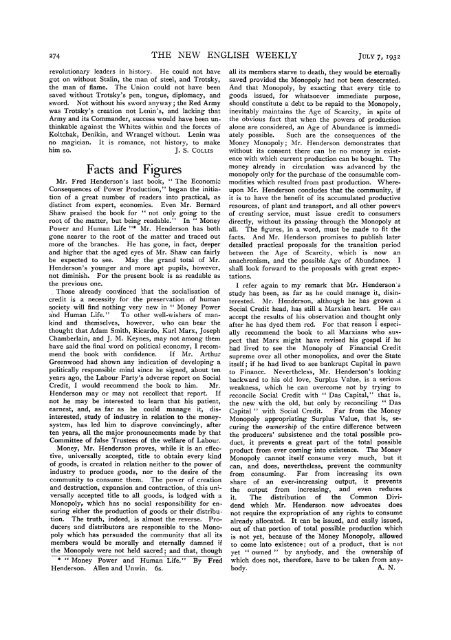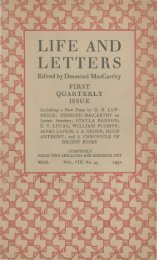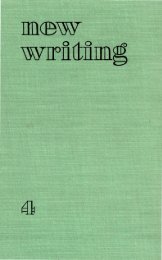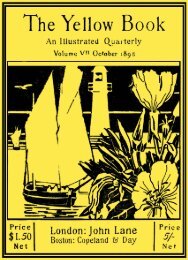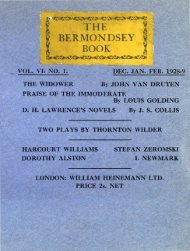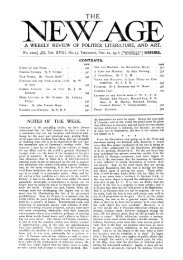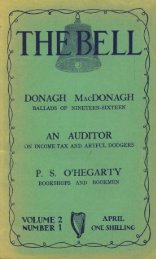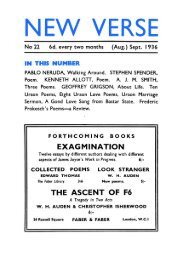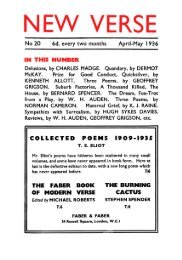Vol. I No. 12 - Modernist Magazines Project
Vol. I No. 12 - Modernist Magazines Project
Vol. I No. 12 - Modernist Magazines Project
You also want an ePaper? Increase the reach of your titles
YUMPU automatically turns print PDFs into web optimized ePapers that Google loves.
274 THE NEW ENGLISH WEEKLY JULY 7, 1932<br />
revolutionary leaders in history. He could not have<br />
got on without Stalin, the man of steel, and Trotsky,<br />
the man of flame. The Union could not have been<br />
saved without Trotsky's pen, tongue, diplomacy, and<br />
sword. <strong>No</strong>t without his sword anyway; the Red Army<br />
was Trotsky's creation not Lenin's, and lacking that<br />
Army and its Commander, success would have been unthinkable<br />
against the Whites within and the forces of<br />
Koltchak, Denikin, and Wrangel without. Lenin was<br />
no magician. It is romance, not history, to make<br />
him so.<br />
J. S. COLLIS<br />
Facts and Figures<br />
Mr. Fred Henderson's last book, " The Economic<br />
Consequences of Power Production," began the initia<br />
tion of a great number of readers into practical, as<br />
distinct from expert, economics. Even Mr. Bernard<br />
Shaw praised the book for " not only going to the<br />
root; of the matter, but being readable." In " Money<br />
Power and Human Life "* Mr. Henderson has both<br />
gone nearer to the root of the matter and traced out<br />
more of the branches. He has gone, in fact, deeper<br />
and higher that the aged eyes of Mr. Shaw can fairly<br />
be expected to see. May the grand total of Mr.<br />
Henderson's younger and more apt pupils, however,<br />
not diminish. For the present book is as readable as<br />
the previous one.<br />
,.. Those already convinced 'that the socialisation of<br />
credit is a necessity for the preservation of human<br />
§ociety will find nothing very new in " Money Power<br />
and Human Life." To other well-wishers of mankind<br />
and themselves, however, who can bear the<br />
thought that Adam Smith, Ricardo, Karl Marx, Joseph<br />
Chamberlain, and J. M. Keynes, may not among them<br />
have said the final word on political economy, I recommend<br />
the book with confidence. If Mr. Arthur<br />
Greenwood had shown any indication of developing a<br />
politically responsible mind since he signed, about ten<br />
years ago, the Labour Party's adverse report on Social<br />
Credit, I would recommend the book to him. Mr.<br />
Henderson may or may not recollect that report. If<br />
not he may be interested to learn that his patient,<br />
earnest, and, as far as he could manage it, disinterested,<br />
study of industry in relation to the moneysystem,<br />
has led him to disprove convincingly, after<br />
ten years, all the major pronouncements made by that<br />
Committee of false Trustees of the welfare of Labour.<br />
Money, Mr. Henderson proves, while it is an effective,<br />
universally accepted, title to obtain every kind<br />
of goods, is created in relation neither to the power of<br />
industry to produce goods, nor to the desire of the<br />
community to consume them. The power of creation<br />
and destruction, expansion and contraction, of this universally<br />
accepted title to all goods, is lodged with a<br />
Monopoly? which has no social responsibility for ensuring<br />
either the production of goods or their distribu<br />
tion. The truth, indeed, is almost the reverse. Producers<br />
and distributors are responsible to the Monopoly<br />
which has persuaded the community that all its<br />
members would be morally and eternally damned if<br />
the Monopoly were not held sacred; and that, though<br />
* " Money Power and Human Life." By Fred<br />
Henderson. Alien and Unwin. 6s.<br />
all its members starve to death, they would be eternally<br />
savecj provided the Monopoly had not been desecrated.<br />
And that Monopoly, by exacting that every title to<br />
goods issued, for whatsoever immediate purpose,<br />
should constitute a debt to be repaid to the Monopoly,<br />
inevitably maintains the Age of Scarcity, in spite of<br />
the obvious fact that when the powers of production<br />
alone are considered, an Age of Abundance is immedi<br />
ately possible. Such are the consequences of the<br />
Money Monopoly; Mr. Henderson demonstrates that<br />
without its consent there can be no money in existence<br />
with which current production can be bought. The<br />
money already in circulation was advanced by the<br />
monopoly only for the purchase of the consumable commodities<br />
which resulted from past production. Whereupon<br />
Mr. Henderson concludes that the community, if<br />
it is to have the benefit of its accumulated productive<br />
resources, of plant and transport, and all other powers<br />
of creating service, must issue credit to consumers<br />
directly, without its passing through the Monopoly at<br />
all. The figures, in a word, must be made to fit the<br />
facts. And Mr. Henderson promises to publish later<br />
detailed practical proposals for the transition period<br />
between the Age of Scarcity, which is now an<br />
anachronism, and the possible Age of Abundance. I<br />
shall look forward to the proposals with great expectations.<br />
I refer again to my remark that Mr. Henderson's<br />
study has been, as far as he could manage it, disin<br />
terested. Mr. Henderson, although he has grown a<br />
Social Credit head, has still a Marxian heart. He can<br />
accept the results of his observation and thought only<br />
after he has dyed them red. For that reason I especially<br />
recommend the book to all Marxians who suspect<br />
that Marx might have revised his gospel if he<br />
had lived to see the Monopoly of Financial Credit<br />
supreme over all other monopolies, and over the State<br />
itself; if he had lived to see bankrupt Capital in pawn<br />
to Finance. Nevertheless, Mr. Henderson's looking<br />
backward to his old love, Surplus Value, is a serious<br />
weakness, which he can overcome not by trying to<br />
reconcile Social Credit with " Das Capital," that is,<br />
the new with the old, but only by reconciling " Das<br />
Capital " with Social Credit. Far from the Money<br />
Monopoly appropriating Surplus Value, that is, securing<br />
the ownership of the entire difference between<br />
the producers' subsistence and the total possible product,<br />
it prevents a great part of the total possible<br />
product from ever coming into existence. The Money<br />
Monopoly cannot itself consume very much, but it<br />
can, and does, nevertheless, prevent the community<br />
from consuming. Far from increasing its own<br />
share of an ever-increasing output, it prevents<br />
the output from increasing, and even reduces<br />
it. The distribution of the Common Dividend<br />
which Mr. Henderson now advocates does<br />
not require the expropriation of any rights to consume<br />
already allocated. It can be issued, and easily issued,<br />
out of that portion of total possible production which<br />
is not yet, because of the Money Monopoly, allowed<br />
to come into existence; out of a product, that is not<br />
yet " owned " by anybody, and the ownership of<br />
which does not, therefore, have to be taken from anybody.<br />
A. N.


